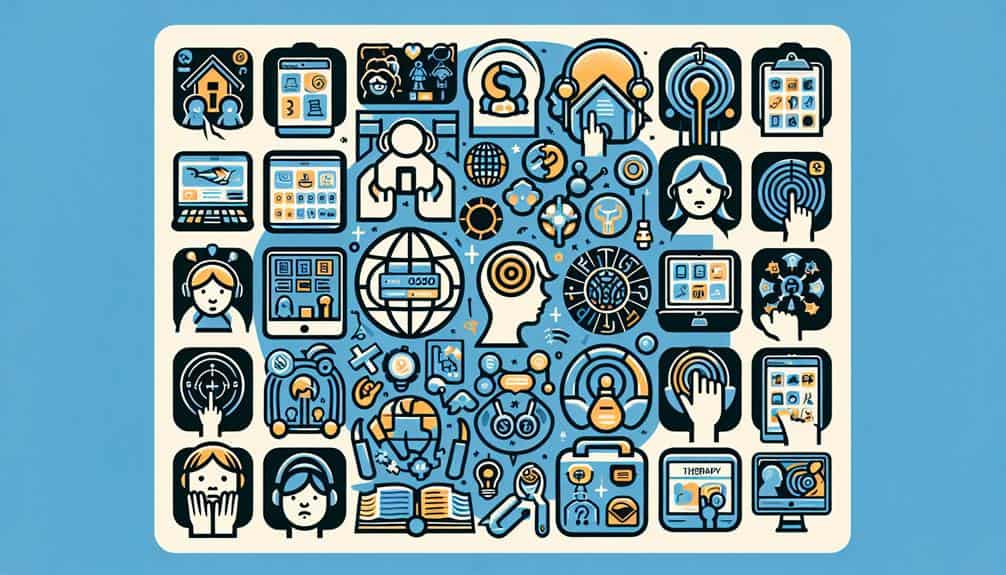Enhance your child's homeschooling journey with adaptive tools tailored to their unique needs. These tools cater to individual learning styles, promoting development and independence. By utilizing assistive devices, sensory tools, and mobility aids, you create a personalized educational experience. Adaptive technology offers interactive feedback, increasing engagement and enjoyment in learning. Select tools based on your child's preferences and strengths, ensuring effective integration. Collaborate with educators and therapists to monitor progress and align tools with your child's learning style. Implementing adaptive tools effectively creates a structured routine for seamless education. Find out more about the benefits and types of adaptive tools for special needs homeschooling.
Key Points
- Enhances personalized learning experiences for special needs children.
- Tailors education to individual learning styles and preferences.
- Promotes independence and boosts confidence in learning.
- Facilitates effective communication and interaction.
- Provides tools to overcome challenges and improve educational outcomes.
Benefits of Using Adaptive Tools
Using adaptive tools in your special needs homeschooling can greatly enhance your child's learning experience and overall development. These tools offer improved engagement by tailoring lessons to your child's unique learning style, ensuring they stay interested and focused.
Personalized learning becomes more attainable as adaptive tools adjust to your child's pace and strengths, providing a customized educational experience that meets their specific needs.
Furthermore, adaptive tools can help increase your child's independence by offering them the support they require to work through tasks on their own. By fostering independence, these tools empower your child to take ownership of their learning journey and build essential life skills.
Effective communication is also facilitated through adaptive tools, as they can assist your child in expressing themselves more clearly and confidently, whether through speech, writing, or other forms of communication.
Incorporating adaptive tools into your special needs homeschooling not only improves engagement and personalized learning but also nurtures your child's independence and fosters effective communication skills, laying a solid foundation for their educational and personal growth.
Types of Adaptive Technology Available
Explore the diverse range of adaptive technology tools that are readily accessible for enhancing your special needs homeschooling experience. When it comes to assistive devices and communication aids, options like speech-generating devices, picture communication boards, and text-to-speech software can provide valuable support in facilitating communication and learning for individuals with special needs.
For sensory tools, products such as sensory fidget toys, noise-canceling headphones, and weighted blankets can help create a calming environment and improve focus during homeschooling sessions.
Additionally, mobility aids like adaptive keyboards, ergonomic chairs, and specialized desks are designed to promote comfort and accessibility for learners with physical challenges.
How Adaptive Tools Enhance Learning
To maximize the educational benefits for your child with special needs, consider how adaptive tools can greatly enhance the learning experience in your homeschooling environment. Adaptive tools play an essential role in improving engagement and increasing independence, making the learning process more effective and enjoyable for your child.
Here's how these tools can benefit your homeschooling journey:
- Personalized Learning: Adaptive tools allow for personalized learning experiences tailored to your child's unique needs and learning style. This customization fosters a deeper understanding of concepts and encourages active participation in lessons.
- Interactive Feedback: With adaptive tools, your child receives immediate and interactive feedback on their progress, helping them stay motivated and on track with their learning goals. This real-time feedback promotes a sense of accomplishment and boosts confidence.
- Promoting Independence: By utilizing adaptive tools, your child can work at their own pace and gain the confidence to tackle challenges independently. This increased independence fosters a sense of empowerment and self-reliance, essential skills for lifelong learning success.
Tips for Selecting the Right Tools
Consider your child's specific needs and learning preferences when selecting adaptive tools for their homeschooling journey. Start by evaluating the tool compatibility with your child's requirements. Look for tools that cater to their individual challenges and strengths.
For example, if your child struggles with reading, consider text-to-speech software. If they've fine motor skill difficulties, look for tools with touch or voice activation features.
Additionally, prioritize your child's user preferences. Involve them in the selection process and consider what tools they feel comfortable using. Some children may prefer visual learning aids, while others might excel with interactive games or auditory tools.
Understanding your child's preferences can help you choose tools that they'll be more motivated to engage with.
Implementing Adaptive Tools Effectively
Maximize the impact of adaptive tools in your child's homeschooling by creating a structured routine that integrates these tools seamlessly into their learning environment. Implementing strategies to effectively utilize adaptive tools can greatly enhance your child's educational experience.
Here are some practical tips to help you maximize the potential of these tools:
- Personalized Learning Plans: Tailor adaptive tools to align with your child's unique learning style and preferences. By customizing their educational experience, you can create a more engaging and effective learning environment.
- Consistent Monitoring and Evaluation: Regularly assess your child's progress and the effectiveness of the adaptive tools being used. Adjust the strategies as needed to promote continuous improvement and excellent results.
- Collaboration with Educators and Therapists: Work closely with teachers, therapists, and other professionals to develop a thorough approach to integrating adaptive tools into your child's homeschooling. Their expertise and insights can provide valuable guidance in maximizing the benefits of these tools.
Frequently Asked Questions
Can Adaptive Tools Be Customized for Specific Disabilities?
Yes, adaptive tools can indeed be customized for specific disabilities. They offer customizable features and specialized adaptations to cater to individual needs effectively. These tools are designed to support and enhance learning experiences for diverse learners.
Are Adaptive Tools Costly and Covered by Insurance?
Making adaptive tools affordable involves exploring cost-effective options. Some tools may be covered by insurance, offering financial relief. Research and consult with providers to maximize coverage. Prioritize your child's needs while balancing budget considerations.
How Do Adaptive Tools Address Individual Learning Styles?
Understanding your learning preferences is essential. Adaptive tools provide personalized accommodations, tailoring instruction to your individual needs. By incorporating assistive technology, homeschooling can be more effective, fostering a supportive and inclusive learning environment.
Do Adaptive Tools Offer Technical Support for Troubleshooting?
When using adaptive tools, technical support is available for troubleshooting any issues you encounter. This assistance guarantees that you can address any challenges promptly, allowing for a smoother learning experience tailored to individual needs.
Can Adaptive Tools Be Used in a Group Homeschool Setting?
Yes, adaptive tools can be beneficial in a group homeschool setting. They can enhance group dynamics by catering to individual needs, promoting inclusivity, and encouraging positive social interactions. These tools foster a supportive and engaging learning environment.



